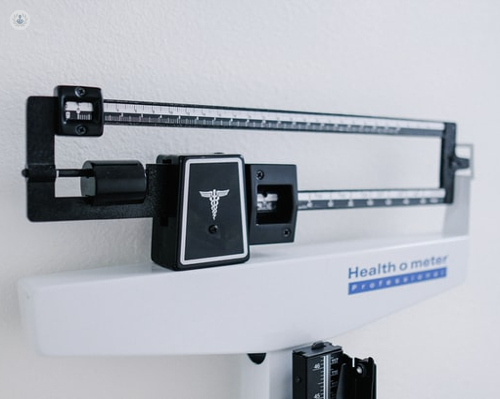Morbid obesity
What is morbid obesity?
Obesity relates to being overweight and having excessive body fat. The most common method used to determine if a person is obese is known as the body mass index (BMI) calculator. This tool is used to measure whether your weight is within a healthy range in relation to your height.
A person who is morbidly or severely obese will have too much body fat for their height. This stage of obesity is also known as class III obesity. The BMI classifications to measure weight in relation to health are as follows:
- Below 18.5 - underweight
- 18.5-24.9 - healthy
- 25.0-29.9 - overweight
- 30.0 and 39.9 - obese
- 40.0 and above - morbidly obese
In cases of morbid obesity, the patient is one hundred pounds (≈7 stone) overweight and has a BMI of forty or higher.

How can morbid obesity affect a person’s daily life?
Being obese, particularly severely so, can make performing daily activities more difficult and can also lead to serious health problems. People suffering from obesity typically experience:
- shortness of breath
- excessive sweating
- snoring
- difficulties when performing physical activities and exercise
- tiredness and fatigue
- pain in the body’s joints and back
- low self-esteem
- feelings of isolation
The psychological impact of being obese or morbidly obese can also impact on mental health and wellbeing which can affect relationships and may even cause depression.
Why is morbid obesity dangerous?
Patients who are morbidly obese have a significantly higher risk of one or more obesity-related diseases, which are known as comorbidities. Unfortunately, these conditions can lead to physical disability or even death in some cases. Comorbidities of morbid obesity include:
- atherosclerosis which can lead to coronary heart disease and stroke
- hypertension (high blood pressure)
- type 2 diabetes
- metabolic syndrome (a combination of diabetes, high blood pressure and obesity)
- asthma
- high cholesterol
- gastro-oesophageal reflux disease (GORD)
- gallstones
- various types of cancer, such as bowel, breast and womb cancer
- fertility problems
- osteoarthritis
- sleep apnoea
- liver and kidney disease
- complications in pregnancy, such as pre-eclampsia and gestational diabetes
Morbid obesity is a serious disease. As a chronic disease, its symptoms build up slowly over time and it can reduce life expectancy by an average of three to ten years depending on its severity.
Who is at risk of developing morbid obesity?
Anyone can become severely overweight if they consume more calories than their body can use up, particularly foods which are high in fat and sugar. Modern lifestyles can also involve spending a lot of time sitting down (whilst driving, working at a desk or watching television, for example) which contributes to weight gain. Unfortunately, these factors mean that many people gain excess weight or develop obesity.
In some cases, genetic factors can play a role in how the body stores energy, but more research is needed into the relationship between genes and weight. Other factors that may contribute to weight gain include lack of sleep and stress. Women living with the condition polycystic ovary syndrome (PCOS) may be more prone to gaining weight and also find it more difficult to lose weight. Various other conditions can also contribute to weight gain, such as an underactive thyroid (hypothyroidism) as well as metabolic factors.

How is morbid obesity treated?
Although morbid obesity is a serious condition, it is very treatable and there are a number of ways patients can be helped to lose excess weight. It is important to seek out specialist advice from a doctor who can advise you on how best to lose weight in your individual case if you are suffering from morbid obesity.
Nutrition
In cases of morbid obesity, it is recommended to work with a registered dietician or a general practitioner who can help you set realistic goals and can create a tailored eating plan. It is also important that you see a specialist to monitor your progress regularly.
It is highly recommended to cut processed junk foods from your diet and replace them with sources of high protein, moderate (good) fats and minimal carbohydrates. Adding a lot of vegetables to your diet as well as eating slowly can help you to be more aware of when you are full. A ketogenic diet can be beneficial for weight loss.
Some people also find that joining a local weight-loss group is helpful as it provides a support network and motivation. Additionally, psychological support from a specialist can be beneficial to change harmful patterns of thinking related to food or eating for some people.
Medication
Some medications, such as Orlistat, may help to reduce the amount of fat absorbed from the food you eat during digestion. However, this is not suitable for everyone.
Exercise
Moving the body every day is important for weight loss and starting with light exercise such as walking or swimming can have a big impact. Eventually, it will be possible to move more and more as you build up your fitness over time.
Intermittent fasting
Intermittent fasting requires you to eat your food through a certain period (or window) of time each day. Popular eating patterns include 16:8 where you eat for 8 hours a day before closing your window for sixteen hours until the following day.
There are different variations to follow, 18:6, 20:4 or even the method that was made popular by Dr Michael Mosely which is known as 5:2 diet. During two days of the week, you eat a maximum of 500 calories, and on the remaining days eat normally.
When the body is fasting, during the period of time that you are not eating, it goes into a state of autophagy, which allows the cells of the body start to renew and clean themselves, which is beneficial in preventing serious medical conditions. It is important to consult a doctor before beginning intermittent fasting or any type of diet, particularly if you are suffering from a serious condition such as morbid obesity.
Surgery
If you have tried to lose weight through diet and exercise and have not been successful, then surgical treatment may be an option. You can discuss the following surgical procedures with a bariatric (weight loss) surgeon, who will determine which of the procedures would be the most beneficial in your case:
- gastric band surgery - where a rubber band is placed around the upper part of the stomach, which limits the amount of food that your stomach can hold
- gastric bypass surgery - the procedure changes how the food that you eat travels through the digestive tract by bypassing a portion of your stomach and your bowel
What type of doctor treats morbid obesity?
Various different doctors may treat a person with morbid obesity including nutritionists and dieticians, bariatric surgeons and specialists in metabolic medicine. Depending on the complications or comorbidities of morbid obesity which a person has developed, they may also require treatment from specialists in cardiology or respiratory medicine amongst others.








